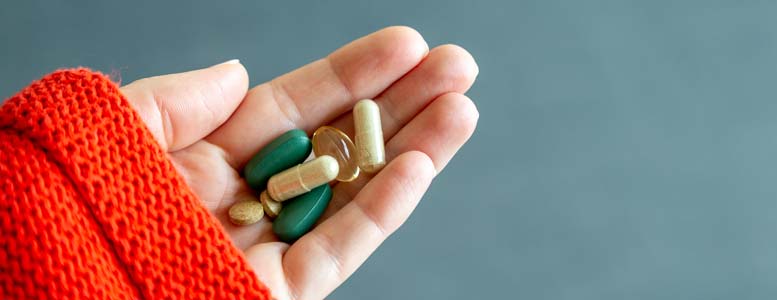Menopause & Perimenopause Guide to Supplements

Enhancing mental health and overall wellbeing, supplements indeed have their merits. However, a haphazard approach to purchasing and consuming them isn’t advisable. Instead of squandering resources, collaborate with a proficient naturopath or nutritional therapist for personalized advice.
Table of Contents
Magnesium
An all-encompassing remedy for perimenopause, magnesium alleviates stress and anxiety by pacifying adrenal glands. Additionally, it bolsters sleep, stabilizes blood sugar levels, augments insulin sensitivity, and facilitates estrogen processing. Crucial for energy generation, muscle relaxation, and bone health, magnesium deficiencies are prevalent due to inadequate dietary intake and modern agricultural practices. Alcohol, excessive sugar consumption, and certain medications further hamper absorption, while stress exacerbates the requirement.
Foods rich in magnesium include black beans, dark leafy greens, pumpkin seeds, flax seeds, hemp seeds, Brazil nuts, almonds, avocados, bananas, salmon, and dark chocolate. When selecting a supplement, avoid magnesium oxide; instead, opt for magnesium citrate or magnesium glycinate.
Vitamin B6
As we mature, our capacity to absorb B vitamins dwindles, resulting in deficiencies that have been linked to cognitive decline, low bone mineral density, impaired DNA repair, and cardiovascular diseases. Among the B vitamins, B6 is particularly noteworthy during perimenopause, as it aids progesterone production, curbs inflammation, supports estrogen detoxification, and alleviates mood-related issues.
Turmeric (Curcumin)
Renowned for its potent anti-inflammatory properties, turmeric root’s active ingredient, curcumin, exhibits antidepressant, antioxidant, antimicrobial, and anticancer qualities. Curcumin supplements can alleviate heavy and painful periods, while including turmeric in soups and curries can also prove beneficial.
Taurine
A non-essential amino acid, taurine plays a critical role in the release of neurotransmitters and has neuroprotective effects. It is involved in memory, learning, and mood, and can help reduce anxiety and stress. Taurine also stimulates bone formation, inhibits bone resorption, and improves insulin sensitivity.
L-theanine
An amino acid that fosters relaxation and anxiety reduction, L-theanine enhances levels of calming neurotransmitters while suppressing excitatory ones. It can help with sleep and lower high blood pressure but may interact with certain medications and supplements.
GABA (Gamma-aminobutyric acid)
An inhibitory neurotransmitter, GABA calms the nervous system, alleviates anxiety, and balances mood. Some supplements can influence GABA, although their efficacy is debated. GABA can interact with high blood pressure medications, antidepressants, and other supplements, necessitating consultation with a healthcare practitioner.
CBD (Cannabidiol)
CBD, the second most abundant active ingredient in cannabis, can assist with anxiety, depression, insomnia, and various other health issues. Opt for a full-spectrum CBD oil derived from hemp, which is legally permissible in the UK. For comprehensive information on CBD, consult Dr. Dani Gordon’s book, The CBD Bible.
Adaptogens
The use of adaptogens is a natural way to assist in coping with physical and emotional stress. These herbal pharmaceuticals are predominantly sourced from plants, while certain medicinal mushrooms are also classified as adaptogens.
Ashwagandha (Withania somnifera)
Renowned as a potent adaptogen, Ashwagandha combats stress and inflammation while shielding cells and DNA from oxidative damage. It bolsters immunity and shows promise in alleviating neurodegenerative conditions. Moreover, it diminishes anxiety levels and can be safely combined with antidepressants.
Maca (Lepidium meyenii)
Maca an adrenal adaptogen, enhances stress management. Although commonly recommended for those with low estrogen, it doesn’t directly stimulate estrogen production. Instead, it balances hormone levels, including estrogen, by regulating the hormonal glands in the hypothalamus and pituitary. Maca has also been shown to improve sleep quality, hot flashes, heart palpitations, mood, energy, and sexual desire. Choose Peruvian maca and consume it as a supplement or add the powder to smoothies.
Rhodiola (Rhodiola rosea):
Extracted from the root of the Rhodiola plant, this adaptogen addresses various neuropsychological symptoms of menopause, such as fatigue, depression, anxiety, memory decline, and stress intolerance. It has been shown to boost energy, enhance attention and memory, and improve stress management.
Holy Basil (Ocimum sanctum, also known as Tulsi):
A revered Ayurvedic herb, Holy Basil is a powerful adaptogen that combats various forms of stress – physical, chemical, and psychological. It can be consumed as a tea, often referred to as “liquid yoga,” and has positive effects on memory, cognition, and depression.
Lemon Balm (Melissa officinalis):
A member of the mint family, Lemon Balm can be consumed as a tea, supplement, or essential oil. It lowers cortisol levels, eases anxiety, enhances memory and concentration, supports sleep, and improves digestion.
Skullcap (Scutellaria lateriflora):
A calming herb, Skullcap helps restore the nervous system. It is frequently combined with valerian, passionflower, or hops to address sleep issues and anxiety. These herbs are commonly found in sleep-inducing teas.
St. John’s Wort (Hypericum perforatum):
Often dubbed as the herbal Prozac, St. John’s Wort can help with depression, anxiety, nervousness, and sleep issues. However, it should not be taken alongside antidepressants, birth control pills, sedatives, pain medications, immune-suppressant medications, or warfarin.
Incorporating these adaptogens into your daily routine may provide immense relief during perimenopause and menopause. However, it is essential to consult a healthcare practitioner to determine the optimal supplements and dosage for your specific needs.
Medicinal mushrooms
With hundreds of varieties, medicinal mushrooms promote health and healing by calming the nervous system, elevating mood, increasing energy and focus, reducing inflammation, supporting the immune system, and regulating blood sugar levels. Examples include Cordyceps, Lion’s mane, and Reishi mushrooms.